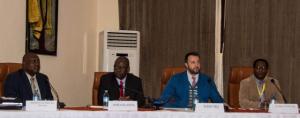Uganda hosts African Regional Workshop on understanding and tracking the TB epidemic for policy and programmatic action
Uganda hosted five-day African Region Workshop on understanding and tracking the Tuberculosis (TB) epidemic for policy and programmatic action. The workshop was organized to build capacity of countries to understand and track the TB epidemic using routine surveillance data and the use of findings to inform policy and programmatic action at global, national and subnational levels.
The Assistant Commissioner, Resource Center at the Ministry of Health (MoH) of Uganda, Dr. Edward Mukoyo represented the Director General of Health Services at the workshop and said that TB greatly contributes to the burden of disease in Uganda. He further said that the outcomes of the workshop will be instrumental in mitigating policies and implementation of strategies to eliminate TB in Uganda.
The World Health Organization (WHO) Country Representative in Uganda Dr. Manzila Tarande Constant, noted that TB is a top killer disease worldwide due to a single infectious agent called Mycobacterium tuberculosis. He also added that 10.4 million people fell ill with tuberculosis in 2015 globally, indicating that about 28,500 people fall ill with TB every day. He went on to say that the workshop will substantially improve the participants’ capacity to understand and track the TB epidemic using routine surveillance data and the use of findings to inform policy and programmatic action at all levels.
During workshop, three complementary products were introduced to countries and they aim to better inform policy, planning and programmatic action. First, the patient pathway analysis (PPA), assessing the alignment of TB patient care-seeking and TB service delivery, led by Macalister University. Secondly, the use of subnational data from multiple sources to inform planning and decision making for locally differentiated approaches through the use of mapping techniques, led by Royal Tropical Institute Amsterdam. The third component was the use of TIME Impact model to inform TB policy decisions, led by the London School of Hygiene and Tropical Medicine (LSHTM).
The workshop attracted 16 countries in East and Central Africa. It was co-organized by WHO TB monitoring and evaluation unit in the Global TB Programme at WHO headquarters, and African Regional Office and The Global Fund, through one of their principal recipients in Uganda, the African Network for the Care of Children Affected by HIV/AIDS (ANECCA).
WHO and technical partner institutions; Centers for Disease Control (CDCD) and Prevention; KNCV; Macalister University; London School of Hygiene and Tropical Medicine; and the Royal Tropical Institute Amsterdam facilitated the workshop.



